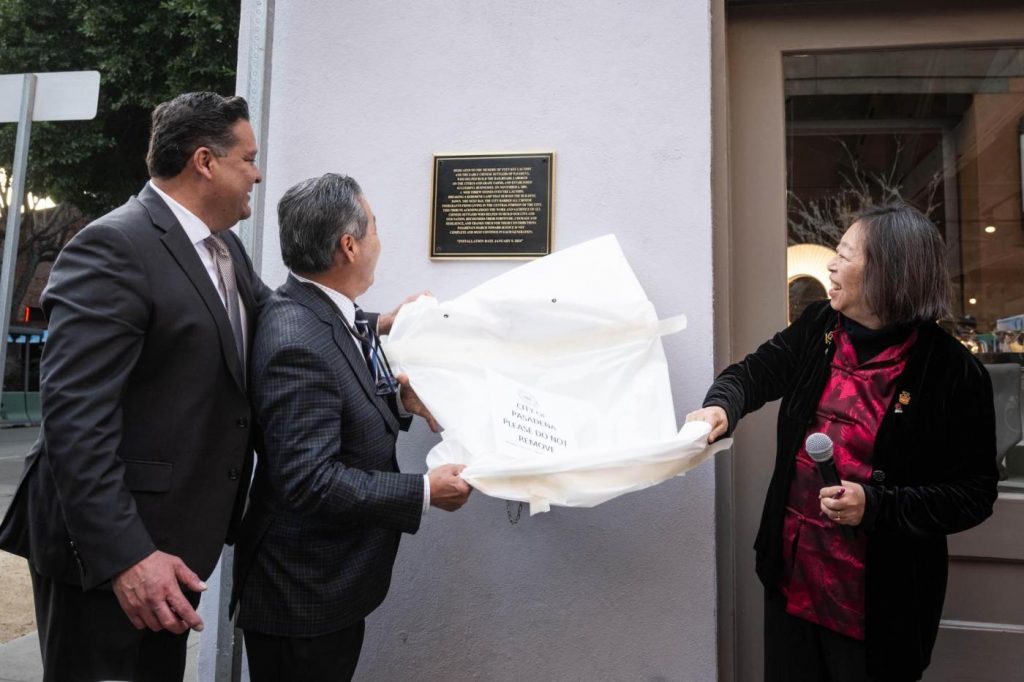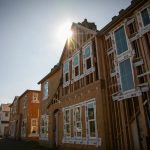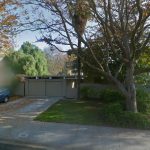City officials joined Asian American community groups and residents on Tuesday, Jan. 9, in Old Town Pasadena, for an unveiling of two new plaques that commemorate a dark chapter in Pasadena history — the targeting of a Chinese-owned business — once located in what is now Mills Place Alley.
“They acknowledge a troubled time in our past — the concerted effort to exclude those of Chinese origin from the city of Pasadena. It’s a tragic past,” said City manager Miguel Marquez, at the unveiling ceremony.
“As a nation, we find ourselves in a frankly anti-‘other’ sentiment. With respect to people of Chinese origin, we remember a few short years ago, during the pandemic, the effort to point a finger at those of Chinese origin. That will not happen again,” Marquez said. “We must do our best to educate so that we don’t repeat that part of our nation’s dark history.”
The new plaques remember a mob-induced fire that occurred in 1885 at a laundromat owned by immigrant Yuen Kee, during the height of nationwide anti-Chinese sentiment.
Leaders and records indicate that Yuen Kee Laundry was one of the first Asian American businesses in the area. Kee moved his business to Fair Oaks Avenue, near Mills Place and other Chinese-owned businesses, in 1883. But two years later on Nov. 6, 1885, a mob started several fires in the area — including in the laundromat, where Chinese Americans were working.
The next day, Pasadena officials drafted the city’s first racial zoning ordinance, further segregating Chinese Americans, and driving out all Chinese immigrants from Pasadena for decades after.
The blazes — or lack of organized response — also led to the formation of the Pasadena Fire Department, which would be incorporated the next year.
For years, old markers at Mills Place Alley — once called Ward Alley — only recognized Alexander Fraser Mills, who planted a citrus grove in the area, and included a simple description of the attack. The old description read: “In 1885, a fire at this site destroyed a laundry establishment owned by Chinese settlers.”
But Pasadena residents notified councilmembers that the description “does not capture the gravity of the events connected to the fire,” according to city reports.
The creation and installation of the new plaques was a collaborative effort started by residents, AAPI community groups and leaders in 2020, who brought their concerns to Pasadena’s Human Relations Commission.
But the new plaques — one located at the intersection of Mills Place and West Green Street, and one on a stand along Fair Oaks and Colorado Boulevard — now tell the full story; even the dark parts.
They read: “Dedicated to the memory of Yuen Kee Laundry and the early Chinese settlers of Pasadena who helped build railroads, labored on the citrus and grape farms and established successful businesses. On November 6, 1885, a mob threw stones into the laundry, breaking a kerosene lamp that burned the building down. The next day, the city barred all Chinese immigrants from living in the central portion of the city.”
“Pasadena’s march toward justice is not complete, and must continue in each generation,” the plaques read.
The efforts cost the city around $6,700, said Lola Osborne, the deputy director of the city’s Parks, Recreation and Community Services Department.
Related Articles
Letters: Cafe’s standard | Racial equity | Plant trees | Oppose hatred | Incarceration no answer | Political court
A ‘pocket of hope’: This Bay Area school district made a difference on Black students’ scores
California police must tell drivers why they’re being stopped starting next year under new law
US college campuses have embraced the Palestinian cause like never before. The story began six decades ago
Commissioner Susan Greenstein, chair of the city’s Human Relations Commission, said she hopes they will “shed light on a true Pasadena story ignored too long,” and turn residents “to the truth of what happened here.”
As the plaques were unveiled, Susie Ling, an associate professor of History and Asian American Studies at Pasadena City College and member of the Chinese Historical Society, said she was filled with “mixed emotions.” Ling and other residents helped spearhead the efforts to put new wording on the plaques.
“We are near marking the first anniversary of the Monterey Park mass shooting last January. That wasn’t an act of Asian American hate — but the deliberate blaming of people of color, especially AAPIs, has caused our community to live with concern and paranoia,” Ling said. She emphasized the importance of telling the stories of Chinese immigrants, who came to the U.S. in search of a better life, but many were met with “a cruel fate.”
“Today, we remember our akongs (grandfathers), and make a longtime commitment to continue to tell their stories,” she said.
At Tuesday’s ceremony, Councilmember Gene Masuda honored several community leaders in the Chinese Historical Society of Southern California, the Pasadena Japanese American Cultural Institute, the city’s Human Relations Commission and other local residents who were involved in the efforts.
Masuda called what happened at Yuen Kee Laundry a “disgraceful truth.”
“The focus on historical accuracy is important; it helps deepen our understanding and appreciation for diversity,” Masuda said. “This plaque serves as a reminder that we must not let history repeat itself. Racism and hate divide us; the solution is respect and kindness, which will unite us.”


